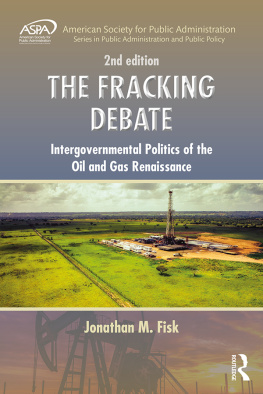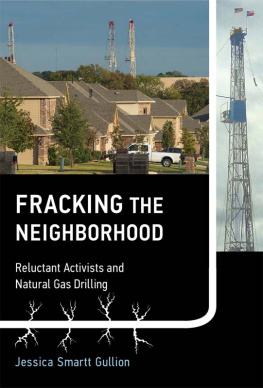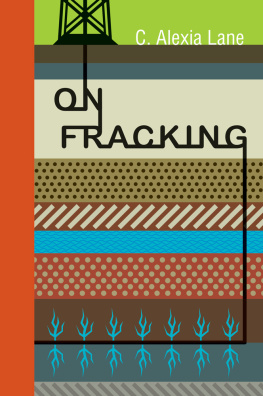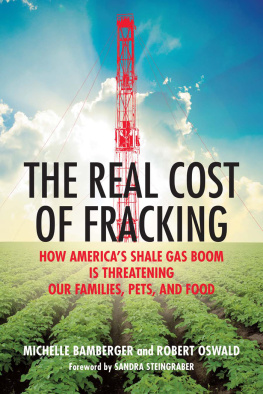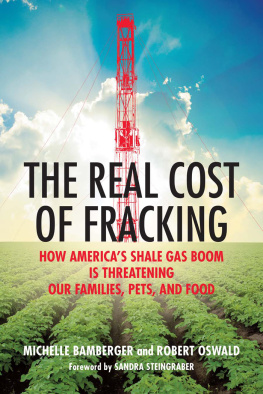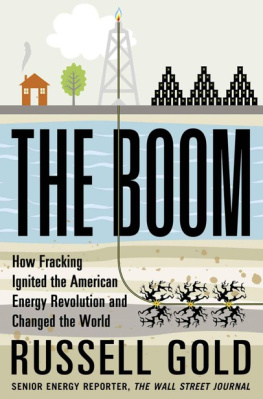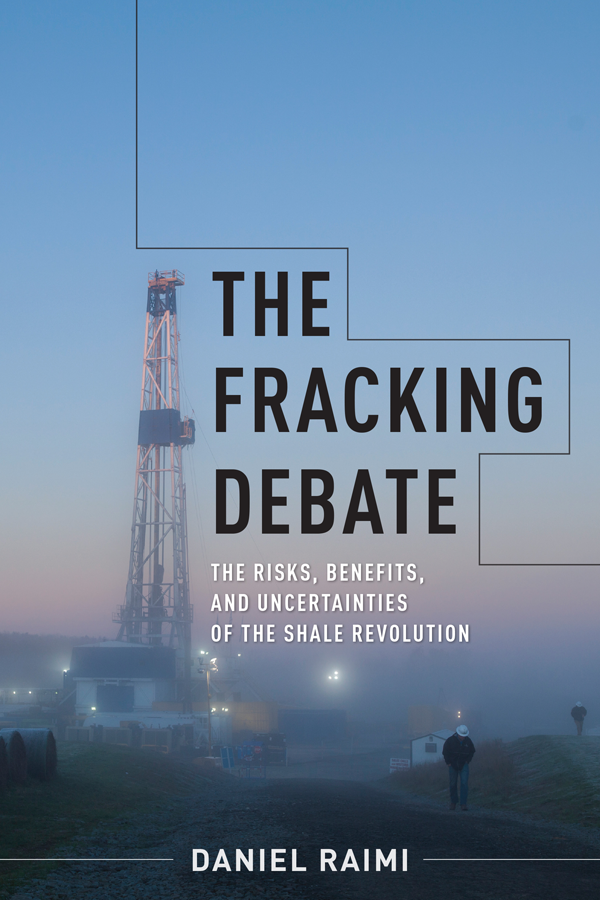Contents
Guide
Pagebreaks of the print version
THE FRACKING DEBATE
CENTER ON GLOBAL ENERGY POLICY SERIES
CENTER ON GLOBAL ENERGY POLICY SERIES
JASON BORDOFF, SERIES EDITOR
Making smart energy policy choices requires approaching energy as a complex and multifaceted system in which decision makers must balance economic, security, and environmental priorities. Too often, the public debate is dominated by platitudes and polarization. Columbia Universitys Center on Global Energy Policy at SIPA seeks to enrich the quality of energy dialogue and policy by providing an independent and nonpartisan platform for timely analysis and recommendations to address todays most pressing energy challenges. The Center on Global Energy Policy Series extends that mission by offering readers accessible, policy-relevant books that have as their foundation the academic rigor of one of the worlds great research universities.
Robert McNally, Crude Volatility: The History and the Future of Boom-Bust Oil Prices (2017)
Richard Nephew, The Art of Sanctions: A View from the Field (2018)
DANIEL RAIMI
THE FRACKING DEBATE
The Risks, Benefits, and Uncertainties of the Shale Revolution
COLUMBIA UNIVERSITY PRESS
NEW YORK

Columbia University Press
Publishers Since 1893
New York Chichester, West Sussex
cup.columbia.edu
Copyright 2018 Daniel Raimi
All rights reserved
E-ISBN 978-0-231-54571-6
Library of Congress Cataloging-in-Publication Data
Names: Raimi, Daniel, author.
Title: The fracking debate : the risks, benefits, and uncertainties of the shale revolution / Daniel Raimi.
Description: New York : Columbia University Press, [2017] | Series: Center On Global Energy Policy series | Includes bibliographical references and index.
Identifiers: LCCN 2017024122 (print) | LCCN 2017026192 (ebook) | ISBN 9780231184861 (cloth : alk. paper)
Subjects: LCSH: Hydraulic fracturingEnvironmental aspectsRisk assessment. | Hydraulic fracturingSocial aspects.
Classification: LCC TD195.G3 (ebook) | LCC TD195.G3 R34 2017 (print) | DDC 363.11/96223383dc23
LC record available at https://lccn.loc.gov/2017024122
A Columbia University Press E-book.
CUP would be pleased to hear about your reading experience with this e-book at .
Cover design: Jordan Wannemacher
Cover photo: Mark Thiessen/ GettyImages
For my parents, Jane and Fred
CONTENTS
I am grateful for the support of many friends, colleagues, and family members who have contributed directly or indirectly to making this book a reality. Thanks to my parents, Jane and Fred, and my sister Lisa for a lifetime of love; to Kari Barsness, Robin Smith, Mary Penny Kelley, and Trina Ozer for bringing me into the DENR fold and giving me an introduction to shale gas; to Melissa Levine, Leena Lalwani, and Charles Watkinson at the University of Michigan for their help understanding how publishing works; to Jeff Collett at Colorado State University, Rick Neitzel at the University of Michigan, and Donna Vorhees at the Health Effects Institute for discussions on air emissions and potential health effects; to Mike Teague, the Oklahoma secretary of energy and environment, for comments on seismicity in Oklahoma; to Eric Kort from the University of Michigan and Mark Brownstein from the Environmental Defense Fund for discussions of methane, ethane, and other air emissions; to Rick McCurdy for graciously allowing me to tell his familys story about Alpine High; to Mary Barber, Gail Dreyfuss, and Max Raimi for their thoughts on an early version of this book; and to Tom Murphy at Penn State University for comments on a near-finished draft. Thank you to the institutions Ive been lucky enough to call home over the past several years: the Duke University Energy Initiative, the University of Michigan Energy Institute, the University of Michigan Gerald R. Ford School of Public Policy, and Resources for the Future. Thank you to Evan Michelson and the Alfred P. Sloan Foundation for supporting related research into oil and gas development, which gave me the opportunity to see the oil and gas fields of the United States. Thank you to Barry Rabe at the University of Michigan for planting the seed of this book, even if he doesnt remember doing so. Thank you to Michael Levi for suggesting I send my idea for this book to Columbia University, and thanks to Jason Bordoff at Columbias Center on Global Energy Policy for helping make it a reality. More than anyone else, Richard Newell at Resources for the Future has given me the opportunity to learn about energy and the environment. He has also been a wonderful teacher, fantastic collaborator, and friend. Jeremy Boak from the Oklahoma Geological Survey provided detailed comments on an early draft of this book and continued to provide constructive feedback during the revision process. I thank him for devoting so much time and for his help making this a better book. Bridget Flannery-McCoy at Columbia University Press has been a fantastic editor, making sure that my arguments are structured logically and helping refine my explanations of issues that can be confusing or counterintuitive. Most importantly, thank you to my wife, Kaitlin Raimi, who has learned more about the oil and gas industry than she ever wanted to know. Her love, friendship, and support have made me happier than I ever thought I could be.
I wasnt expecting a polka band.
It was February 2016, and I was in Houston, Texas, for CERAWeek, the annual energy-industry confab that brought together highfliers from around the world: heads of state, corporate icons, academic experts, and others came to discuss the state of the oil and gas industry, learn about new technologies, and assess what might lie ahead. With prices at crushing lowsa barrel of crude oil was trading for about thirty dollars, down from one hundred dollars two years earlierId expected a somber air. But at the weeks opening evening, a grand cocktail party with the crme de la crme of the industry, sponsored by the German corporate giant Siemens, it was as though I had entered an alternate reality, one in which the industry was thriving, crude oil and natural gas prices were near all-time highs, and celebration was the order of the day.
At least thats what it felt like as the six-person polka band started up, the tuba belting out lumps of bass notes as servers sliced thick, heavy slabs of beef at the two prime-rib carving stations. Hotel staff stood behind black-draped bars, pouring top-shelf liquor, fine wines, and microbrews. At other tables, three-tiered silver platters gleamed atop white tablecloths, boasting rich arrays of German-themed hors doeuvres. Regardless of the challenges the industry faced, tonight was a night to have fun, to network, and, inevitably, to commiserate about the pain of low prices.
Had it not been for the crushing prices, there would have been every reason for domestic oil and gas companies to celebrate: production of both oil and natural gas was near all-time highs, and the United States had reclaimed the title of worlds largest producer. Just ten years earlier, most had expected the countrys decades-long decline in production to continue indefinitely and, with it, an ever-deepening reliance on energy imported from other continents. But things had changed.
As Ill describe over the course of this book, the U.S. oil and gas industry has, over the past decade or so, combined a suite of technological breakthroughs with incremental improvements that have pushed production to levels beyond what even the most optimistic forecaster would have dreamed. These innovations brought the industry to new heights, took it to new corners of the United States, and sparked controversies no one had anticipated.


